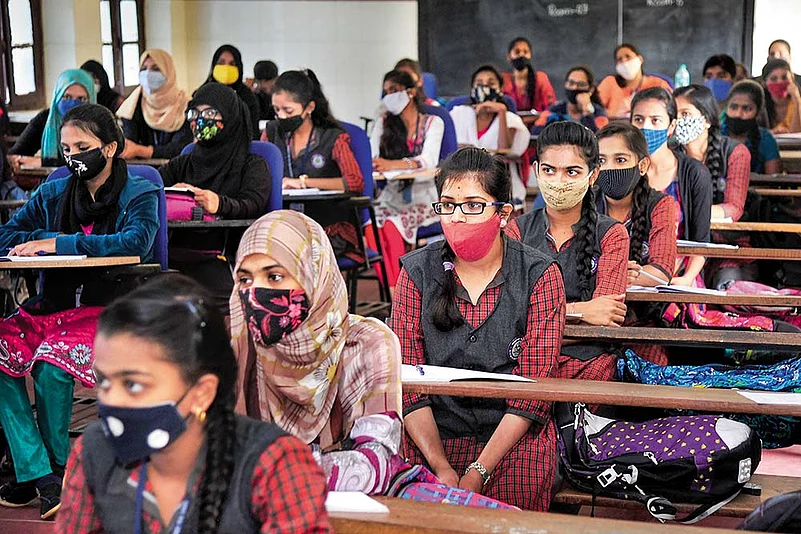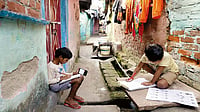Of all the routines twisted out of shape by the pandemic, few involve higher stakes, in terms of future impact, than the one on education. Online classes and their uneven, unreliable spread; unfinished syllabi; uncertainty about schools reopening; the psychological impact of enforced seclusion on sensitive young minds….
Fifteen-year-old Rashmi, a class 10 student of a private school in Ranchi, is anxious and stressed since the announcement of the dates for the board examination of the Central Board of Secondary Education (CBSE) on December 31 last year. She says she attended all the online classes and went through the study material provided by her school during the academic year but is not sure of scoring well in the exams scheduled to start from May 4, even as the CBSE has reduced the syllabus by 30 per cent. “I am facing difficulties in mathematics,” she says.
Her parents blame the online classes, saying they remain inadequate and ineffective. “She says the pace of teaching was so fast that she not get chance to get her doubts cleared. At the end of the academic year, most students have similar complaints. Teachers tried to give their best but could not properly monitor students’ progress due to the limitation of the online mode. Children also lacked self-discipline. I did not send her for coaching because of the pandemic. All coaching institutes were closed,” says Rashmi’s father Shyama Kant Sharma.
Unprecedentedly, lakhs of class 10 and 12 students are to take board exams in the next few months with varying levels of preparation after completing their academic course entirely through the virtual mode. Yet now, anxiety about their performance is eating away at many of them, even though the CBSE and some other secondary school examination boards have significantly reduced the syllabus due to the pandemic.

Experts are unanimous that online education during the pandemic could not have replaced the efficacy and impact of physical classes. It also denied right to education of children who could not afford to access online classes due to financial constraints.
How long will schools remain closed? Many state education departments have begun pondering over it since the arrival of vaccines for COVID-19. A consistent decline in positive cases in the past few months has also made authorities consider reopening schools in phases. In what could come as a relief for students like Rashmi in the national capital, the Delhi government has announced a reopening of schools for 10th and 12th standards from the week starting January 18. However, attendance is optional, and only with parents’ consent.
In Assam, all classes have resumed in schools from January 1. Some other states are considering starting classes for students of standards 9 to 12 from March. Depending on the pandemic situation, classes can resume for students of standards 6 to 8 later. Kindergarten and primary schools (classes 1 to 5), however, are unlikely to resume this year.
Officials say completion of the first phase of vaccination will pave the way for reopening of schools and other educational institutions, as it will it break the chain of spread of the virus and instil confidence among parents.
The first phase of vaccination is set to start from January 16 across the country. At least three crore health workers and other frontline workers are expected to get the vaccine in the first round. About 27 crore people aged above 50 and those under 50 with co-morbidities are next in line to be vaccinated in this phase. It will take about a year to complete, say experts.
“People will slowly get vaccinated, schools will start reopening unless something goes wrong and there is a spurt in cases,” says Bijaya Kumar Sahoo, advisor and working president of Odisha government’s Adarsha Vidyalaya Sangathan.
After remaining closed for over nine months, schools in Odisha reopened for the students of classes 10 and 12 from January 8. The state government also announced dates for board examinations. The class 10 board exam will start from May 3 and conclude on May 15. The annual plus-II exam will be held from May 15 to June 11. Practical exams for both class 10 and 12 will start from April 29.
“The Odisha government is treading cautiously. It has opened classes for students of 10 and 12. My feeling is that classes for standards 9 and 11 may start by March this year. Based on the assessment of the situation, the government will allow the opening of schools for students of classes 7 and 8 and then the remaining classes in a phased manner,” says Sahoo.
However, Delhi and Odisha aren’t the only states to resume classes for students of classes 10 and 12 ahead of the board exams. Bihar and Jharkhand recently announced dates for board exams and reopened schools for students about to write them. While board exams in Bihar for class 12 students will start from February 1, students of class 10 will take theirs from February 17. In Jharkhand, board exams for both classes 10 and 12 are scheduled to begin from March 9.
Last year in October-November, Uttar Pradesh, Punjab, Haryana, Madhya Pradesh, Assam, Bihar and Andhra Pradesh governments had allowed the partial reopening of schools for classes 9 to 12 under strict COVID-19 safety protocols in a phased manner. However, attendance of students in urban areas continues to remain poor.
The decision to reopen schools in a staged manner is a weighty one for governments to make, even as it comes during a waning pandemic. Before announcing, on January 13, the reopening of schools for standards 10 and 12, Delhi education minister Manish Sisodia had said at a press conference,
“Brainstorming is on within the education department to find out how early schools can be reopened in Delhi, especially for the classes 10 and 12…. We are closely monitoring the situation. The coronavirus pandemic has badly hit education in the country.”
Eminent virologist and academic Shahid Jameel says states should conduct sero surveys in different areas to understand the spread of infection before taking a call on reopening schools. All municipalities should generate local data in their respective jurisdictions, he says. “It is clear that online teaching is not a very good solution for our country. Students from modest backgrounds are not able to afford the kind of platforms needed. On the other hand, you cannot open up and risk children getting infected. A proper solution possibly would be different, nuanced strategies for different areas of the country, instead of just applying the same rule. States should have the freedom to decide,” he suggests.
Schools can be reopened, says Jameel, in areas where the infection is minimal but with all precautions, so that schools do not become the spreading grounds for infection. “Children should also be educated to follow the COVID-19 safety guidelines,” he adds.
People from Uttar Pradesh, Bihar, Jharkhand and Chhattisgarh claim there are rural areas with low impact of the virus. That, counter experts, might be the result of insufficient Covid tests. They, however, suggest state governments should identify such areas and reopen schools under strict COVID-19 safety protocols. “District collectors of such areas should take the initiative and recommend reopening of schools if there is evidence to show that people are not infected with COVID-19,” a senior official of the CBSE said.
Coming as it does during the gravest crisis in our lifetime, something that’s local and global in equal measure, a resumption of normal pedagogic practices should only have one imperative: the kids should be all right.

























